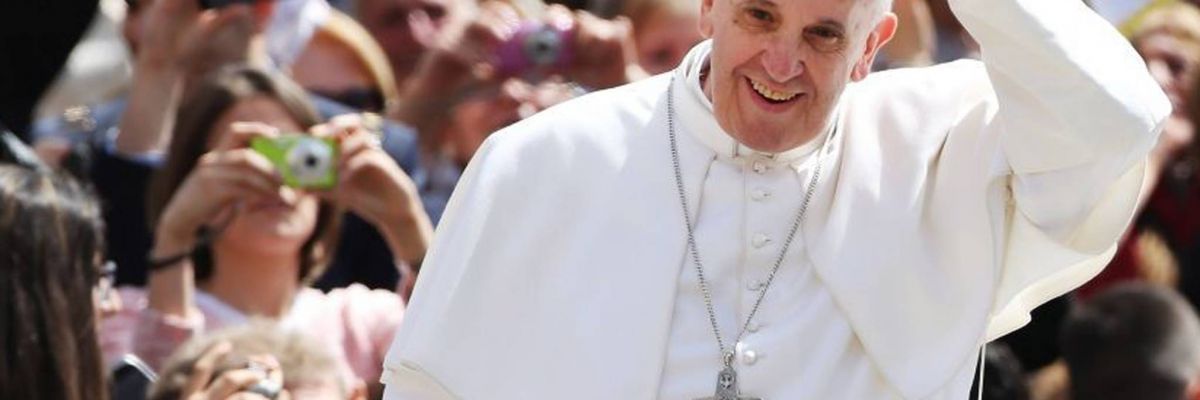
I love our pope. Not just because he is pope, but because of the kind of pope he is. I love his focus on the poor and on poverty of spirit, his emphasis on the radicalness of the gospel, and his back-to-basics approach to evangelization.
As someone who has worked for the Church for twenty years and can be prone to both myopia and cynicism, I feel personally convicted by his warning against becoming a “self-referential Church.” He reminds me that our task is not to spend our time decorating our faith-bunker to make it pretty and hospitable, but to go out to the world. Why haven’t I ever told the random guy next to me on a plane all about Jesus? Pope Francis won’t let me evade the question.
Another part of Francis’s appeal is his frankness, so perhaps it’s no surprise that the publication last week of his interview with an Italian journalist (full text in America magazine here) sent sparks of controversy flying in all directions, lighting a hundred brushfires.
Did the pope say to stop talking about abortion, contraception, and gay marriage?
What did he mean by “obsession” with “disjointed” doctrines?
What is the “new balance” of which he speaks?
Only a handful of the 12,000-plus words in this informal and wide-ranging interview deal with the infamous “pelvic” issues, but that didn’t stop the secular media and their fellow travelers in Culture-of-Death advocacy from anointing Francis as the maverick pope—the modern reformer who would finally brush away the cobwebs of antiquated Catholic moral teaching. Liberal journalist Chris Hayes called Francis the “Best. Pope. Ever.” Professional vulgarian Chris Rock went a step further, naming him the “greatest man alive.” NARAL put up a banner ad giving thanks from pro-choice women everywhere.
Meanwhile there has been no small amount of fretting in the faithful Catholic camp. This is not the first time in his short pontificate that the pope seems to have chosen his off-the-cuff words imprudently. If nothing else, some have wondered, could Francis exercise just a little more care? Sure, the media will cut and paste his words to fit their agenda no matter what, but he doesn’t have to make it easy for them, right?
For my part, other than some mild cringing at expressions that you can tell from a mile off are fat meatballs that secular journalists will smack out of the park, I had but one point of chagrin: It seems like the pope missed a great opportunity.
God’s Laws Show His Love
When in a former life I used to do marriage preparation and chastity education for a Midwestern diocese, one feature of my presentations that always resonated with people was the novel (to them) idea that God’s moral laws are not something distinct from his love, but rather expressions of it. This is because, like the Sabbath, morality is made for man.
As John Paul II wrote, the moral life is a both a response to and a result of “the gratuitousness of God’s love” (Veritatis Splendor 10).
Yes, when we break moral laws we give offense to the Lawgiver, and we create some kind of cosmic rift with the Eternal Law, but we also harm our natures. We deflect ourselves from the true object of happiness. God, who wills that we be happy, gives us commandments as a sure road map to that destination.
To a culture born and bred to view commandments as divine buzzkills, to mentally bifurcate gentle-loving-merciful God from commanding-judging-condemning God, this notion of a radical unity between love and law can be transformative. It’s a key that opens the door to an integrated Christian life. I’ve watched it happen.
And so I can only think it unfortunate that instead of taking the opportunity to affirm that integration (which he surely understands backwards and forwards) and add to it his own distinct touches, Pope Francis has given the appearance of undoing it. When he says that we need to find a “new balance”—which implies a zero sum game in which we’re either preaching God’s love or his laws—he seems to separate what should be joined. When he says that “the proclamation of the saving love of God comes before moral and religious imperative,” however true that may be in a sense (although, in another sense the opposite is also true: John the Baptist preached repentance from sin as a prelude to the Good News), it likewise suggests distinct categories: there’s the saving love of God, and then there are moral laws.
Apart from downplaying the integrated view of love and law that can be such a great pastoral tool, this kind of language is also prone to being taken by some as a confirmation that—aha, we knew it!—all those faithful preachers and pastors, the NFP teachers and sidewalk counselors, the heroic family witnesses to Catholic moral teaching, have all this time been just a little out of whack in their law-obsession.
But we don’t need to find a balance that turns up one part of the gospel and turns down another. We need to proclaim them both at full volume, and in harmony.



